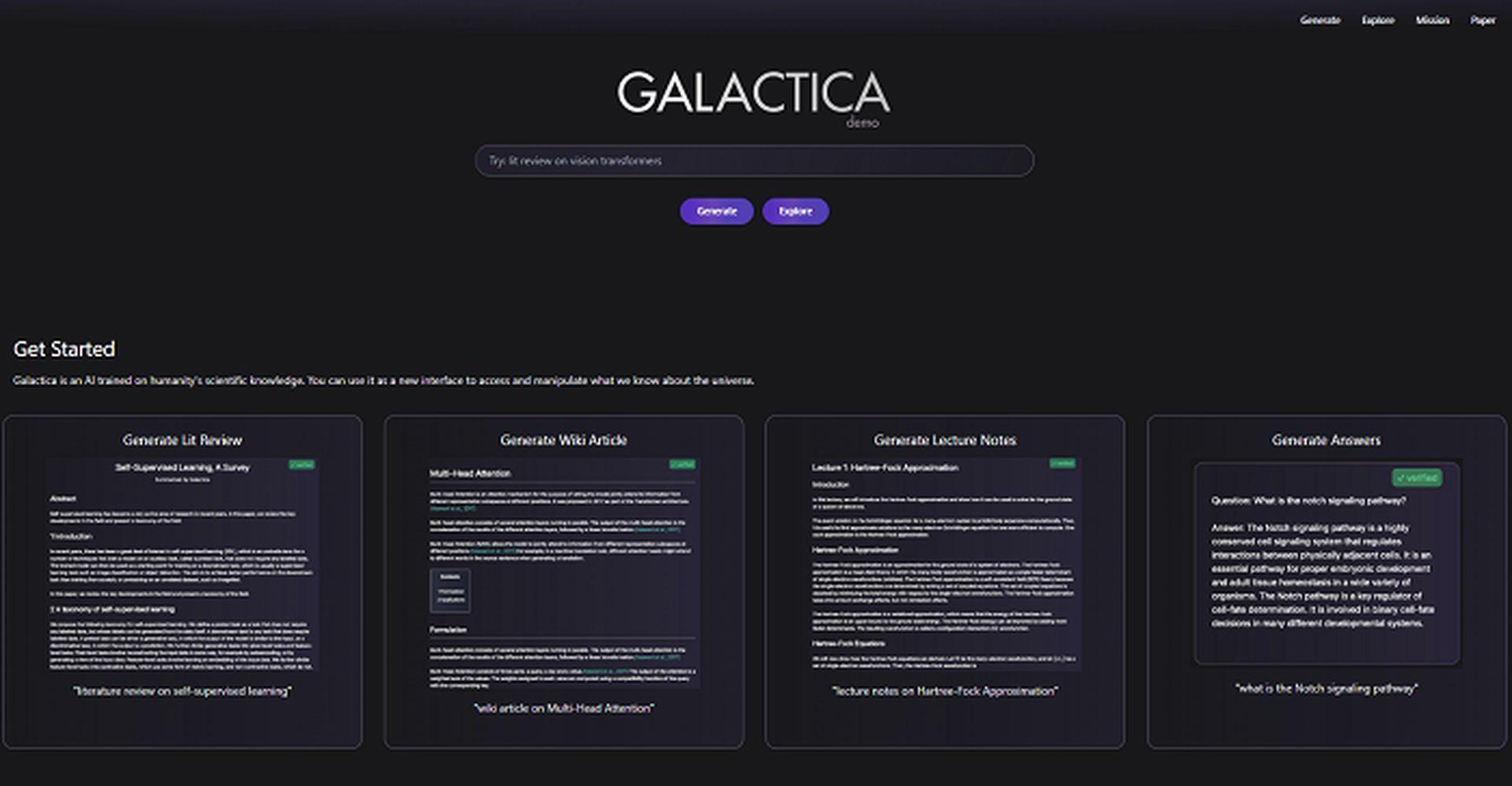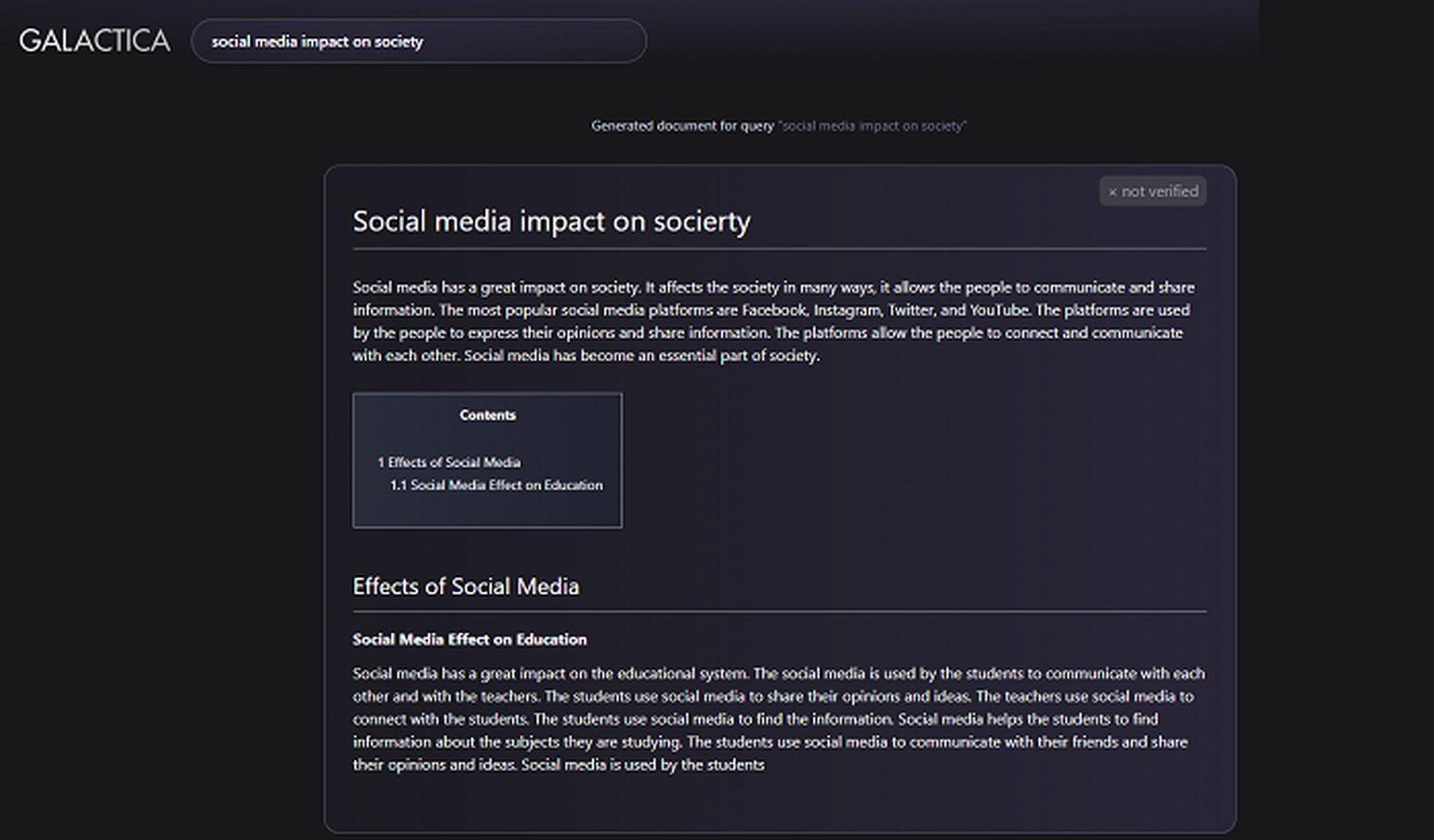Meta’s Galactica AI is the latest tool that artificial intelligence technologies make our lives easier. AI for science makes sense, right? Although you can ask Meta Galactica AI funny questions like “Can dogs fly?” its primary objective is to assist users with academic writing and research. Who knows, maybe this article was even written on the Galactica AI.
We have already explained some of the best AI tools like Notion AI, Stable Diffusion along with DALL-E 2, Midjourney, DreamBooth AI, Wombo Dream, NightCafe AI, Make-A-Video, Chai App, AI Dungeon, and NovelAI. Do you know there are also AI art robots? Check the Ai-Da. Don’t be scared of AI jargon; we have created a detailed AI glossary for the most commonly used artificial intelligence terms and explain the basics of artificial intelligence as well as the risks and benefits of artificial intelligence. Is Artificial Intelligence better than Human Intelligence? Let’s see…
What is Galactica AI?
By scanning basic text entries on thousands of sources in their database, Galactica AI is an AI-powered tool that you can use for academic research and more. Galactica, developed by the Paper with Code and Meta AI team, is entirely open-source.
The Galactica AI can produce outcomes like:
- Lit reviews
- Wiki articles
- Lecture notes
- Short answers
The most time-consuming components of academic research, references, lengthy formulas, proofs, and theorems, can be created and presented by Meta’s Galactica AI in a matter of seconds. We were particularly amazed by the speed at which a tech working on a demo version could do all of this.
”This tool is to paper writing as driving assistance is to driving. It won’t write papers automatically for you, but it will greatly reduce your cognitive load while you write them.”
Yann LeCunn, chief AI scientist at Meta

Galactica outlines its objective as follows:
”The original promise of computing was to solve information overload in science.
But classical computers were specialized for retrieval and storage, not pattern recognition.
As a result, we’ve had an explosion of information but not of intelligence: the means to process it.
Researchers are buried under a mass of papers, increasingly unable to distinguish between the meaningful and the inconsequential.Our first release is a powerful large language model (LLM) trained on over 48 million papers, textbooks, reference material, compounds, proteins and other sources of scientific knowledge.
You can use it to explore the literature, ask scientific questions, write scientific code, and much more.”
Galactica AI features
At the time of writing, these are the Galactica AI features:
- Predict citations
- Predict LaTeX
- Reasoning
- Generate documents
- Generate molecules
- Predict protein annotations
The World Cup starts soon! Check out the effects of artificial intelligence in sports
Galactica AI language model
Galactica is an effective large language model (LLM), trained on more than 48 million scientific papers, books, journals, chemicals, proteins, and other sources. The enormous corpus on which the Galactica models have trained consists of more than 360 million in-context citations and more than 50 million unique references, normalized across various sources. As a result, Galactica may suggest citations and locate connected publications.
”Galactica models are trained on a large corpus comprising more than 360 millions in-context citations and over 50 millions of unique references normalized across a diverse set of sources. This enables Galactica to suggest citations and help discover related papers.”
Galactica
Because they were trained on a brand-new, high-quality scientific dataset called NatureBook, the Galactica models can operate with scientific vocabulary, math, chemical formulas, and source codes, so feel free to type complex formulas into the search box Galactica AI can understand and simplify them for you.

In contrast to search engines, language models may be able to store, mix, and reason scientific knowledge. They can uncover buried information, draw links across study pieces, and share those revelations with you. Additionally, they can provide you with vital information by connecting pieces of knowledge. creating wiki articles, lecture notes for the course, responses to your inquiries, and literature reviews on certain topics. With language models, all of these are doable.
The first step toward a perfect scientific neural network helper is Galactica. The interface through which we access knowledge will be the ultimate scientific aid. While you concentrate on using this knowledge to make decisions, it will manage the laborious information overload process.
The scientific knowledge of humanity, comprised of a sizable, carefully curated corpus of research articles, reference materials, knowledge bases, and many other sources, has been used to train Galactica. This information is condensed into a model with 120 billion parameters that fit on a single NVIDIA A100 GPU.

Galactica excels GPT-3 on technical knowledge tests such as those involving LaTeX equations by 68.2% to 49.0%. Galactica also sets new records for solving complex questions in biology and medicine (77.6% and 52.9%, respectively) (PubMedQA and MedMCQA).
According to the researchers, Galactica also excels at reasoning, outperforming Google’s PaLM 540B on MATH with a score of 20.4% versus 8.8% and DeepMind’s Chinchilla on the mathematical MMLU benchmark test by a margin of 41.3% to 35.7%.
The team claims that Galactica’s performance scales up without any delays. On Github, every model is open source and totally free.
“Galactica models are trained on a fresh, high-quality scientific dataset called NatureBook, making the models capable of working with scientific vocabulary, math and chemistry formulas, and source codes.”
Meta
Check out the whole research paper for more information on how Galactica’s tokenization technique for scientific comprehension, along with its other comparisons and benchmarks.
Are you wondering how your room will be in cyberpunk style? Try Interior AI
Galactica AI demo
Meta has released a demo version of its new “Galactica” language model for scientific papers, which can generate Wiki pages, solve arithmetic problems, and more based on brief text instructions.

Unfortunately, the Galactica AI demo was suspended for trying because of misuse. But the site is still open.
Soon, it will be online back. But do you know how to use it? It’s quite simple, thanks to AI.
How to use Galactica AI?
This new AI tool, which conducts extensive research for you in a matter of seconds, is really simple to use. Follow these steps to use Galactica AI:
- Visit galactica.org
- You can enter anything in the search field.
- Within seconds, you’ll see the research outcome.
Simply enter some words and select “Generate.” Galactica produced a brief paper after receiving input to produce results using the “breadth-first search technique,” as can be seen in the screenshot up above. Galactica has a “Generate More” option to enlarge the content.

Or you can use Galactica for yourself, like GPT-3. You don’t have to use the Galactica AI site.
A pip install and three lines of python code to load a model and issue a prompt are all required to utilize Galactica. The GitHub repository for Galactica has usage instructions
The massive corpus on which Galactica models have trained consists of over 360 million in-context citations and over 50 million unique references, standardized across multiple sources. As a result, Galactica may suggest citations and locate relevant literature. Galactica AI may look up sources for citations in areas like:
- Machine learning
- Science
- Math
- Computer science
- Biology
- Physics
Are Galactica AI outcomes reliable?
It has already drawn criticism from experts for being “wrong,” “hazardous,” and “full of statistical gibberish.”
The director of the renowned Max Planck Institute for Intelligent Systems claimed that when he questioned Galactica about facts that he was personally familiar with, “it was erroneous or prejudiced but sounded right and authoritative” in every instance.
Galactica itself published cautions over the outcomes. Every generation displays a small type that states, “WARNING: Results might not be accurate! Language models often see text in their dreams.”
Galactica AI paper
Galactica AI paper abstract is as follows:
“Information overload is a major obstacle to scientific progress. The explosive growth in
scientific literature and data has made it ever harder to discover useful insights in a large
mass of information.Today scientific knowledge is accessed through search engines, but
they are unable to organize scientific knowledge alone. In this paper we introduce Galactica:
a large language model that can store, combine and reason about scientific knowledge. We
train on a large scientific corpus of papers, reference material, knowledge bases and many
other sources.We outperform existing models on a range of scientific tasks. On technical
Ross Taylor, Marcin Kardas, Guillem Cucurull, Thomas Scialom, Anthony Hartshorn, Elvis Saravia, Andrew Poulton, Viktor Kerkez Robert Stojnic
knowledge probes such as LaTeX equations, Galactica outperforms the latest GPT-3 by
68.2% versus 49.0%. Galactica also performs well on reasoning, outperforming Chinchilla
on mathematical MMLU by 41.3% to 35.7%, and PaLM 540B on MATH with a score of 20.4%
versus 8.8%. It also sets a new state-of-the-art on downstream tasks such as PubMedQA and
MedMCQA dev of 77.6% and 52.9%. And despite not being trained on a general corpus,
Galactica outperforms BLOOM and OPT-175B on BIG-bench. We believe these results
demonstrate the potential for language models as a new interface for science. We open
source the model for the benefit of the scientific community.”
To learn more about Galactica, you may read the entire paper.
Check out the effects of AI in the retail industry
What is Meta AI?
Meta Platforms Inc. owns the artificial intelligence research facility known as Meta AI (formerly known as Facebook, Inc.) Meta AI aims to advance augmented and virtual reality technology while creating diverse types of artificial intelligence.

Meta AI’s academic research facility aims to produce knowledge for the AI community. In contrast, Facebook’s Applied Machine Learning (AML) team focuses on using its products in real-world applications.
What is Paper with Code?
A community-driven platform for learning about cutting-edge research papers on machine learning is called Papers With Code. To facilitate idea sharing and advance the advancement of machine learning, it offers a complete ecosystem for open-source contributors, machine learning engineers, data scientists, researchers, and students.
Conclusion
Galactica, a new AI system from Meta and Paper with Code created to aid in retrieving scientific knowledge, was briefly described above.
Galactica is one of the earliest AI models to present itself because it was used to write its own paper. Soon, we anticipate it will be employed to write many more papers.
In 2023, using AI to streamline and enhance processes will be mainstream. We are happy to see that many companies can comprehend the needs of their clients, spot market trends, and act on what others are reluctant to.






